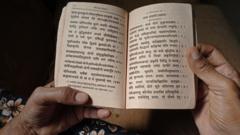In 1996, Ananya Vajpeyi, a doctoral student of history, made a fascinating discovery at the University of Chicago's Regenstein Library—the prestigious South Asia collection. "I've spent time in some of the leading South Asia libraries of the world, at Oxford and Cambridge, Harvard and Columbia. But nothing has ever matched the unending riches held at the University of Chicago," remarked Ms. Vajpeyi, now a visiting professor at Ashoka University, India. The University of Chicago boasts over 800,000 volumes related to South Asia, making it one of the foremost collections worldwide focused on this region. The origin of this treasure trove can be traced back to the PL-480 program, initiated in 1954 under the Food for Peace initiative, which represented a notable aspect of Cold War diplomacy and was signed into law by President Dwight D. Eisenhower.
Under PL-480, countries like India could purchase U.S. grain using local currency. This flexible arrangement not only alleviated India's foreign exchange challenges during times of extreme food shortages in the 1950s and 1960s but also created funds to enhance U.S. university libraries. These local currency funds helped acquire books, periodicals, and other learning materials in various Indian languages for over two dozen universities, transforming institutions like the University of Chicago into central hubs for South Asian studies. Notably, manuscripts were excluded due to India's antiquity laws.
"PL-480 has produced remarkable and unforeseen benefits for the University of Chicago and more than 30 other U.S. collections," stated James Nye, director of the Digital South Asia library at the University of Chicago. The journey to amass a rich library collection from South Asia was challenging. A dedicated team was established in New Delhi in 1959 to facilitate the procurement of resources. While initially focused on government publications, the scope expanded to include an array of books and periodicals.
By 1968, 20 U.S. universities were benefitting from this growing collection. Maureen LP Patterson, a bibliographer focused on South Asian studies, highlighted that in the early years of PL-480, the Delhi team faced difficulties navigating India's diverse linguistic landscape to source relevant books. As part of the process, specialized dealers from various publishing hubs were enlisted to cover different languages, creating an efficient collaboration.
The PL-480 program notably sought to build a comprehensive collection of Indian literature while also curtailing excessive acquisition of low-value fiction. By the mid-1960s, the focus shifted toward "research level material," leading to a significant influx of scholarly resources to American campuses. Reports indicated a diverse selection of works, including historical analyses and cultural studies of India.
However, as Todd Michelson-Ambelang, librarian for South Asian studies at the University of Wisconsin-Madison, points out, the removal of literary collections from the Indian subcontinent through PL-480 may have contributed to knowledge gaps, necessitating that researchers travel abroad for access. Maya Dodd of India’s FLAME University argues that many books unavailable in India can still be found in U.S. libraries, often marked with "PL-480."
Stating the preservation challenges faced by Indian libraries, Michelson-Ambelang contrasts them with the well-maintained resources in Western libraries. He also notes that despite increased access, these Western libraries carry a colonial legacy, often catering to academics within their institutions and thereby limiting broader access to South Asian literature.
The PL-480 program’s conclusion in the 1980s placed the financial responsibility on American libraries, leading schools like the University of Chicago to spend significant amounts on acquiring new titles annually. Still, Ms. Vajpeyi sees the outcomes of the program favorably, recalling her experience accessing a wealth of resources critical for her diverse research across multiple languages. "At the Regenstein Library, I never failed to find the books I needed," she shares, contrasting it starkly with the often dismal state of resources in India.






















